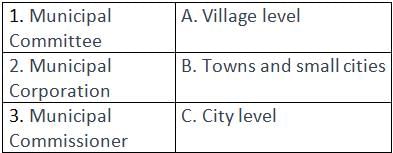Class 6 Exam > Class 6 Tests > Test: Livelihoods-Rural and Urban - 2 - Class 6 MCQ
Test: Livelihoods-Rural and Urban - 2 - Class 6 MCQ
Test Description
10 Questions MCQ Test - Test: Livelihoods-Rural and Urban - 2
Test: Livelihoods-Rural and Urban - 2 for Class 6 2025 is part of Class 6 preparation. The Test: Livelihoods-Rural and Urban - 2 questions and answers have been prepared
according to the Class 6 exam syllabus.The Test: Livelihoods-Rural and Urban - 2 MCQs are made for Class 6 2025 Exam.
Find important definitions, questions, notes, meanings, examples, exercises, MCQs and online tests for Test: Livelihoods-Rural and Urban - 2 below.
Solutions of Test: Livelihoods-Rural and Urban - 2 questions in English are available as part of our course for Class 6 & Test: Livelihoods-Rural and Urban - 2 solutions in
Hindi for Class 6 course.
Download more important topics, notes, lectures and mock test series for Class 6 Exam by signing up for free. Attempt Test: Livelihoods-Rural and Urban - 2 | 10 questions in 10 minutes | Mock test for Class 6 preparation | Free important questions MCQ to study for Class 6 Exam | Download free PDF with solutions
Test: Livelihoods-Rural and Urban - 2 - Question 1
The Gram Panchayat needs approval from the ____________ for its work.
Detailed Solution for Test: Livelihoods-Rural and Urban - 2 - Question 1
Test: Livelihoods-Rural and Urban - 2 - Question 2
The Municipal Corporation is responsible for managing Gram Panchayat activities.
Detailed Solution for Test: Livelihoods-Rural and Urban - 2 - Question 2
Test: Livelihoods-Rural and Urban - 2 - Question 3
What is the primary role of the Municipal Commissioner in a Municipal Corporation?
Detailed Solution for Test: Livelihoods-Rural and Urban - 2 - Question 3
Test: Livelihoods-Rural and Urban - 2 - Question 4
The workload of the municipality is sometimes shared by ____________.
Detailed Solution for Test: Livelihoods-Rural and Urban - 2 - Question 4
Test: Livelihoods-Rural and Urban - 2 - Question 6
All citizens aged 21 or above can contest elections in a Municipality.
Detailed Solution for Test: Livelihoods-Rural and Urban - 2 - Question 6
Test: Livelihoods-Rural and Urban - 2 - Question 7
Surat city has set a role model for controlling ____________.
Detailed Solution for Test: Livelihoods-Rural and Urban - 2 - Question 7
Test: Livelihoods-Rural and Urban - 2 - Question 8
What is the main task of rural administration?
Detailed Solution for Test: Livelihoods-Rural and Urban - 2 - Question 8
Test: Livelihoods-Rural and Urban - 2 - Question 9
What is the primary function of the Gram Panchayat?
Detailed Solution for Test: Livelihoods-Rural and Urban - 2 - Question 9
Test: Livelihoods-Rural and Urban - 2 - Question 10
In the Panchayati Raj System, what is the role of the Zila Parishad?
Detailed Solution for Test: Livelihoods-Rural and Urban - 2 - Question 10
Information about Test: Livelihoods-Rural and Urban - 2 Page
In this test you can find the Exam questions for Test: Livelihoods-Rural and Urban - 2 solved & explained in the simplest way possible.
Besides giving Questions and answers for Test: Livelihoods-Rural and Urban - 2, EduRev gives you an ample number of Online tests for practice
Download as PDF















